Good morning!
Greetings in the name of the father, the son, and the Holy Spirit.
Dear brothers and sisters, when troubles of any kind come your way, consider it an opportunity for great joy. For you know that when your faith is tested, your endurance has a chance to grow. So let it grow, for when your endurance is fully developed, you will be perfect and complete, needing nothing. (James 1:2-4)
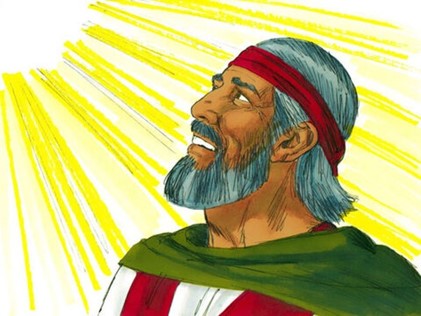
Moses faithfully obeyed God’s command nine times. Moses went to Pharaoh and demanded, “Let my people go” from the bondage of Egypt as slaves. However, God also told Moses Pharaoh would harden his heart and refuse to let the Israelites go even after getting God’s fearful plagues on the Egyptians. In other words, Moses knew his mission was destined to fail. Even so, Moses was faithful to God every time up to nine times. The repetitive sure failures could not deter Moses. God loved Moses’ faith and his absolute obedience.
At the tenth time, God came to Moses and told,
“I will strike Pharaoh and the land of Egypt with one more blow. After that, Pharaoh will let you leave this country. In fact, he will be so eager to get rid of you that he will force you all to leave. Tell all the Israelite men and women to ask their Egyptian neighbors for articles of silver and gold.”
What a message that Moses waited and waited! Moses waited for the moment for 80 years. Upon hearing God’s voice, Moses felt he was flying over clouds. Indeed, God patiently waited for the moment that Moses endured till he faithfully delivered God’s message to Pharaoh nine times, although Moses knew he would not get what he wanted because Pharaoh would harden his heart and refuse to free his fellow Israelites again and again. For Moses, it was truly painful to be obedient to God. Moses also knew God could touch Pharaoh’s heart to make it soft, but God did not. Instead, God kept letting Pharaoh harden his heart. But Moses was always faithful to God. Precisely, nine times without arguing with or complaining to God.
How often have we been in a situation we must endure like Moses? God has the power to change for us to get what we have prayed for, but God does not. It is not all. Despite our diligent and fervent prayers to God with all our hearts, mind, and soul, we really don’t want to see something happening in our lives. Then what have we done? Have we given up on God and stopped praying to God? Or have we kept praying to God despite fearful and hateful things happening in our lives?
For Moses, who was absolutely faithful to God nine times, God also caused the Egyptians to look favorably on Moses and the people of Israel. And Moses was considered a very great man in the land of Egypt, respected by Pharaoh’s officials and the Egyptian people alike.
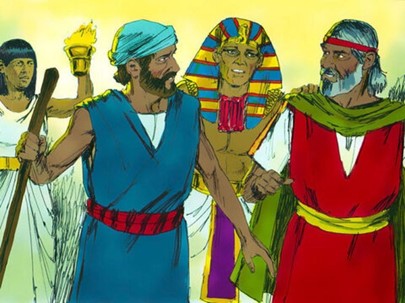
How about God throughout Moses’ journey with God? God loved Moses and patiently watched over Moses to overcome the nine difficult tests with prayers and obedience in faith in Him. God was truly patient as parents are extremely patient with their children and closely and carefully watch over them in a sports game or a classroom play with full of love for them.
Whenever Moses obediently went to Pharaoh, God rejoiced as parents joyfully shout while watching their children make a score at a sports game. For God, it was a triumphant moment. Then Moses became deeply disappointed because Pharaoh again hardened his heart and did not let his fellow Israelites go. Moses, as a human being, truly struggled. Moses believed God could stop hardening Pharaoh’s heart. But God did not. Instead, God kept let Pharaoh harden his heart.
However, God, full of love and mercy, had never left Moses alone. God’s hand was busy for Moses not to fall off from his faith completely. Indeed God only allowed Moses to struggle to the level, not one percent more than he could endure or one percent less. All Moses’ obedient acts and heartbreaking disappointments were, after all, indispensable ingredients to lead Moses up to the maturity which God truly desired from Moses. Indeed, all that Moses endured were God’s manifestations of His unfathomable love toward Moses.
God is faithful, and he will not let you be tempted beyond your ability, but with the temptation he will also provide the way of escape, that you may be able to endure it. (1 Corinthians 10:13b)
Therefore, when we meet truly painful failures in our lives, let’s remember Moses. And look back at our lives. Then we will see God’s hand all over our lives, actively working on us with His unfathomable love, grace, and mercy in unparallel patience.
Then Moses obediently and joyfully went to Pharaoh. For Moses, it was the best trip to Pharaoh. God finally promised that Pharaoh would let his fellow Israelites go. Moses announced to Pharaoh,
“This is what the LORD says: At midnight tonight I will pass through the heart of Egypt. All the firstborn sons will die in every family in Egypt, from the oldest son of Pharaoh, who sits on his throne, to the oldest son of his lowliest servant girl who grinds the flour. Even the firstborn of all the livestock will die. Then a loud wail will rise throughout the land of Egypt, a wail like no one has heard before or will ever hear again. But among the Israelites it will be so peaceful that not even a dog will bark. Then you will know that the LORD makes a distinction between the Egyptians and the Israelites. All the officials of Egypt will run to me and fall to the ground before me. ‘Please leave!’ they will beg. ‘Hurry! And take all your followers with you.’ Only then will I go!”
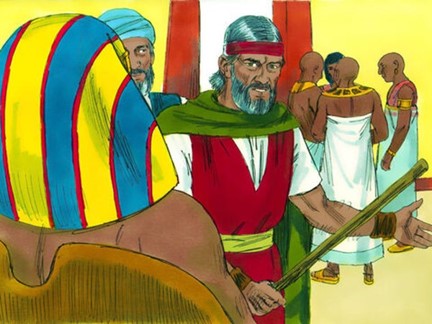
At the last meeting with Moses, Pharaoh threatened to kill Moses, and he really meant it. But when Moses came for the tenth meeting, Pharaoh could not do as he planned. Moses looked as if he were a completely different person. Moses was exceptionally competent. Pharaoh felt some mysterious power was with Moses, which he could not describe, preventing him from arresting Moses to kill.
For this time, Pharaoh carefully heard God’s message through Moses, which was incomprehensible to him – killing all firstborns in Egypt one night. Pharaoh pondered about God’s message brought by Moses. But Pharaoh could not figure out the real meaning because it was complete nonsense to Pharaoh. Pharaoh then laughed and hardened his heart.
Moses soon realized that God would kill all of Egypt’s firstborns because Pharaoh hardened his heart again without knowing what would really come. It was the last time Pharaoh could harden his heart. Pharaoh then attempted to arrest Moses to kill Moses, but he could not. Even he could not vocalize his order to capture Moses to the high-ranking officials standing before him. Moses safely left the palace.
God was greatly pleased with what Moses did. Despite Pharaoh’s death threat, Moses went to Pharaoh and faithfully delivered God’s message. Moses gave the last warning from God to Pharaoh.
Then God gave the following instructions to Moses and Aaron:
“From now on, this month will be the first month of the year for you. Announce to the whole community of Israel that on the tenth day of this month, each family must choose a lamb or a young goat for a sacrifice, one animal for each household.”
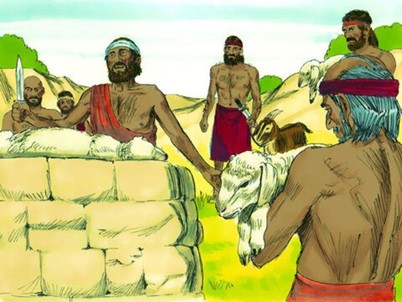
God instructed the beginning of a new chapter for the Israelites by counting the current month as the first month of the new era set by God. God asked to prepare a lamb or a young goat for a sacrifice for all sins of the Israelites before entering the new era of freedom set by God by truly being God’s people.
God continued,
“Take special care of this chosen animal until the evening of the fourteenth day of this first month. Then the whole assembly of the community of Israel must slaughter their lamb or young goat at twilight. They are to take some of the blood and smear it on the sides and top of the doorframes of the houses where they eat the animal.”
After giving special care to the chosen animal for four days, God instructed the Israelites to sacrifice the chosen animal to God and then eat it together with the entire family. God then commanded to put some blood on the sides and top of the house’s doorframes. It must have been an odd command, and they had difficulty connecting placing blood on the doorframes with the tenth plague of killing the firstborn sons.
Anyone who obeyed what God commanded was saved from the tenth plague. To receive God’s protection from the tenth plague, they needed enough faith to do something not so obvious to their eyes. The blood was a small but significant sign of their faith.
Then God gave detailed instructions to the Israelites through Moses.
“These are your instructions for eating this meal: Be fully dressed, wear your sandals, and carry your walking stick in your hand. Eat the meal with urgency, for this is the LORD’s Passover.”
Why did God give yet another somewhat odd instruction? The Israelites would no longer live in Egypt as they used to, but they had to be ready for God’s promised land by leaving Egypt, where they were enslaved for 430 years. God was about to lead, and they had to follow. To do so, they had to be fully ready by being fully dressed, wearing sandals, and carrying a walking stick. They were like soldiers ready for an imminent battle with uniforms, helmets, combat boots, and rifles in hand. It is not time to relax, but be ready with urgency with everything orderly, including eating the meal, because God was about to lead the Israelites from Egypt to the Promised Land. Then God gave the name of the day — “the LORDS’ Passover.”
God explained what would happen that night and how God would protect those faithful to God’s command.
“On that night, I will pass through the land of Egypt and strike down every firstborn son and firstborn male animal in the land of Egypt. I will execute judgment against all the gods of Egypt, for I am the LORD! But the blood on your doorposts will serve as a sign, marking the houses where you are staying. When I see the blood, I will pass over you. This plague of death will not touch you when I strike the land of Egypt.”
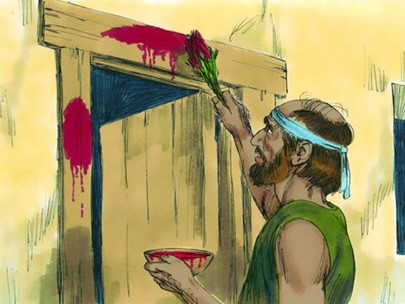
Again to the Israelites, God’s command does not make sense. Let’s put us in the shoes of the Israelites. Could they understand the relationship between the blood on the door frames and God’s tenth plague killing all firstborns in Egypt? Nobody understood why God gave such instructions, but they obeyed. Only after the tenth plague was over, the Israelites understood why they had to put the blood on the door frame. It is the same for us. When we hear God’s command, sometimes it does not make sense to us, and we don’t understand we have to obey. Then later, we know why God gave such command, and we had to obey when we look back on our lives.
We don’t mean God did not explain to the Israelites and us. Yes, God explained, but it is not easy to understand. However, it does not matter. What we need is our obedience to God and His command, whether God’s command makes sense or not.
Why does God work in this way? First, we cannot directly comprehend what God is about to do, which is beyond our comprehension. Can our kids really understand us and our thoughts? The gap between God and us is much bigger (precisely speaking, it is infinite) than between kids and their parents. Therefore, God wants not our rational thinking or understanding of Him or His commands but our humble, obedient faith in Him.
Moses had such faith in God. Moses spent 80 years of walk with God. Did Moses get it by just spending the long years? Not really. It is even true that Moses struggled. Moses’ walk with God was neither straight nor direct. Moses had many ups and downs and many turns, but Moses could complete his walk with God because of God’s love and mercy.
God tenaciously held Moses for 80 years till Moses became the most humble and faithful person on the face of the earth. It is God’s well-hidden secret for His beloved children, including Moses and us.
Now Moses was a very humble man, more humble than anyone else on the face of the earth. (Numbers 12:3)
Then God said,
“This is a day to remember. Each year, from generation to generation, you must celebrate it as a special festival to the LORD. This is a law for all time.”
After we truly appreciate God’s merciful hand in our lives, then what should we do? We should remember what God has done to us. All God’s children surely have special experiences with God, which cannot be forgotten forever. By the way, all special experiences with God are not just for us to remember but also for our children, children of children, and their descendants, generation after generation, forever.
And we should remember what God did as often as possible. It is how we glorify God, who has done marvelous things in our lives.
Moses called all the elders of Israel together and gave the instruction that he received from God. Moses emphasized the remembrance of what God was about to do for the Israelites, especially when they entered the promised land that God gave to Abraham, Isaac, and Jacob, the forefathers of the Israelites.
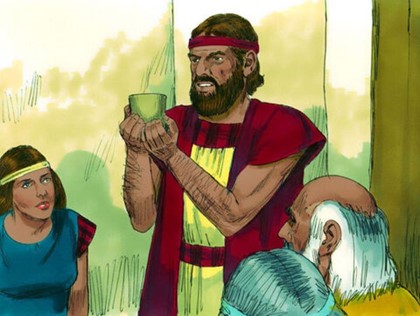
“Remember, these instructions are a permanent law that you and your descendants must observe forever. When you enter the land the LORD has promised to give you, you will continue to observe this ceremony. Then your children will ask, ‘What does this ceremony mean?’ And you will reply, ‘It is the Passover sacrifice to the LORD, for he passed over the houses of the Israelites in Egypt. And though he struck the Egyptians, he spared our families.’”
When Moses finished speaking, all the people bowed to the ground and worshiped God.
So the people of Israel did just as the LORD, God, had commanded through Moses and Aaron. And that night at midnight, the LORD struck down all the firstborn sons in the land of Egypt, from the firstborn son of Pharaoh, who sat on his throne, to the firstborn son of the prisoner in the dungeon. Even the firstborn of their livestock were killed. Pharaoh and all his officials and all the people of Egypt woke up during the night, and loud wailing was heard throughout the land of Egypt. There was not a single house of the Israelites where someone had not died. Truly unthinkably amazing thing had happened in Egypt by the hand of our Omnipotent God.
Yes, God is faithful to His children. God never misses what God has promised, but it might be seen as delayed, but it is not. As Moses and the Israelites were fully ready to receive God’s promise, God fulfilled His promise after 430 years of slavery in Egypt. Then the Israelites told and retold the story from generation to generation. So will we do in Him with His strength, love, and mercy while rejoicing in Him under all circumstances with hope in Him.
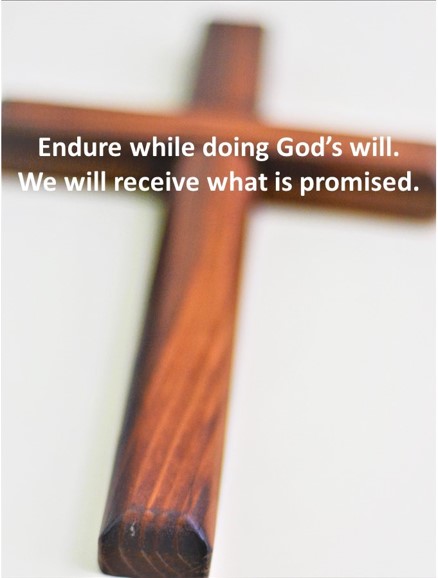
Therefore do not throw away your confidence, which has a great reward. For you have need of endurance, so that when you have done the will of God you may receive what is promised. (Hebrews 10:35-36)
